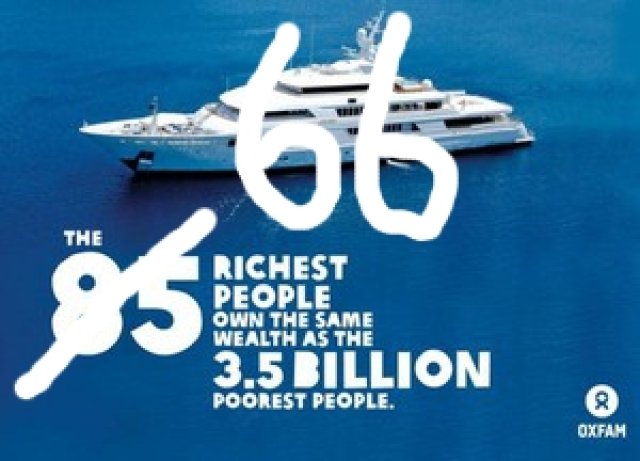
Many people were shocked in January when non-profit development organisation Oxfam released a report that showed that the richest 85 people in the world owned more wealth than half of the world's population.
Within the space of a few months, that number has dropped to just 66.
Oxfam's latest report, Still The Lucky Country?, produced in preparation for the G20 summit in Brisbane in November, explodes the myth of an egalitarian Australia.
“Over the past 30 years the gap between the rich and the poor has increased rapidly in a majority of the world’s countries,” it says. “This increasing inequality is evident in all but four G20 member countries and Australia is no exception.
“The richest 1% of Australians owns the same wealth as the bottom 60%. Australia’s richest person owns more than the bottom 10% of the population combined (2.27 million people) and the nine richest individuals have a net worth of US$54.8 billion, more than the bottom 20% (4.54 million people).”
In reality, this underestimates the economic power of the richest 1% because they also have effective control of the bank savings, superannuation and minor shareholdings that some of the 60% may nominally own. Furthermore, most of the wealth of ordinary people is held in the form of equity in their homes. They do not use this as capital, as the richest 1% do, to make profits out of exploiting the labour of others.
The concentration of ownership of capital is now so high that it is making ever greater demands for profit at the cost of great human suffering and environmental destruction. It is now an absolute barrier to an effective response to the global warming emergency.
Oxfam also did a survey of people in Australia about their response to this gross inequality and the response, predictably, was:
• 79% of Australians surveyed think the gap between richest and poorest Australians has widened over the past decade and 64% of those thought that this was making Australia a worse place to live.
• 70% of Australians surveyed think it is unfair that the richest 1% of Australians owns more than the poorest 60% of Australians.
• 76% of Australians surveyed think the very wealthy do not pay enough tax.
• 79% of respondents believed the rich had too much influence over where Australia is headed.
• 75% surveyed think it is important that the Australian government take action to close the gap between average and poor Australians, and the richest Australians; and
• 79% of Australians surveyed want world leaders to tackle the growing issue of inequality.
This help explains why there is such a groundswell of public opposition to the federal budget which hits the poorest people the hardest while increasing subsidies, tax cuts and concessions for the corporate rich.
This is why people are demanding that the Greens, Labor and Independents block the budget in the Senate.
Green Left Weekly has championed the call to block the budget, but, of course, we know that this is only one step in a bigger struggle to replace the system that has created this accelerating, unfair, undemocratic and ecologically unsustainable concentration of wealth and power in the hands of a tiny minority.
If you agree with this perspective, please make a donation to our fighting fund on the toll-free line at 1800 634 206 (within Australia) or make a donation online.
Direct deposits can also be made to Greenleft, Commonwealth Bank, BSB 062-006, Account No. 00901992. Otherwise, you can send a cheque or money order to PO Box 515, Broadway NSW 2007.
Comments
camilleB replied on Permalink